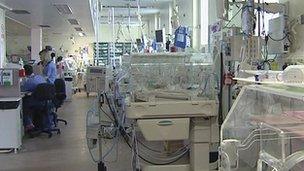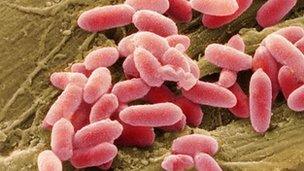Pseudomonas infection - 'no new cases'
- Published

The neo-natal unit at the Royal is undergoing a deep clean
There have been no new cases of the Pseudomonas bacterial infection in Belfast's Royal Jubilee Hospital, the health minister has said.
The neo-natal ward is undergoing a deep clean this weekend, following the deaths of three babies from the infection.
Edwin Poots said on Saturday night there was no further need to transfer mothers outside Northern Ireland.
He said testing had shown six confirmed cases.
The three infants died over a two-week period this month. All the babies in the unit are being tested to see if they have the infection.
In a statement, Mr Poots said the neo-natal network was "managing well".
"As one would expect in circumstances such as this, there is currently extra pressure on the system.
"However, with the help of all neo-natal units in Northern Ireland our service is coping. "
Infection risk
Pseudomonas can cause breathing difficulties and tissue damage.
The infection can live on surfaces for several days, one expert told the BBC, and a team of specialists is working to identify the Belfast source.
Bio-decontamination of the main part of the neo-natal unit began on Saturday and will take about 24 hours to complete.
Mr Poots added: "Ensuring that we eradicate the source of infection and are able to fully re-open the neo-natal unit at the Royal Jubilee Maternity Hospital as quickly as possible remains a key priority."
He said the unit was the only part of the Royal affected - delivery wards and all other services are operating as normal and expectant mothers are being urged to attend their appointments as scheduled.
The neo-natal unit has the highest number of intensive care cots in Northern Ireland.
As a result of the infection, two mothers were sent to Dublin to deliver their premature babies.
Cathy Martin, who went into premature labour in the Royal, was one of them.

Pseudomonas bacteria can cause infections in the chest, blood and urine
She said: "Having lost a baby myself at birth last year I really can empathise, to some degree, with the parents who are going through what must be traumatic grief and a horrible hole in their lives now".
It has emerged that in December at Altnagelvin Hospital in Londonderry, a baby died of a different strain of the bacterial infection.
GP Dr Sarah Jarvis told BBC News the infection was a risk to "the very, very young, the very, very old, burns victims or cancer victims".
She said the infection can take hold in areas such as sinks and in water pipes with stagnant water. The bacteria can live for several days on surfaces but can be destroyed by vigorous hand-washing.
The Department of Health in Northern Ireland said there was no evidence to link the current outbreak in the Royal Hospital to that of the incident at Altnagelvin.
It said all necessary control measures were put in place at the time and "the infection was eradicated".
The Belfast Trust said the test results from babies who have been swabbed may not all be known until the beginning of next week.
A helpline has been set up for parents on 028 90 635 389.
- Published9 October 2012
- Published21 January 2012